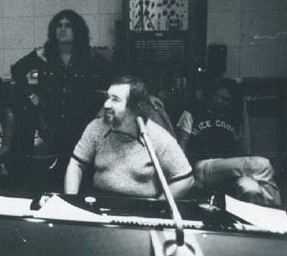

Jack Richardson was head of Nimbus 9 production in Canada. When it became time for the band to record their third album 'Love It To Death' Shep went after Richardson, due to his success with Canadian band 'The Guess Who'. The story goes that Richardson wasn't interested, but after constant hounding from manager Shep Gordon he sent his new assistant Bob Ezrin to see them to stop them calling him. It didn't work as Ezrin actually saw potential in the band. Ezrin ended up co-producing 'Love It To Death' and 'Killer' with Richardson [although it's unclear how much input Richardson actually had], and Jack later produced 'Muscle Of Love' alone.
Richardson was highly respected in the recording industry and has a Juno award for 'Producer of the Year' named after him. He died on May 13th 2011, aged 81. His son, Garth Richardson, has also engineered some Alice Cooper recordings.
From Mixonline.com:
Richardson started out playing double bass in school orchestras, graduating to local and regional dance bands in the 1940s, like The Westernaires in Toronto. In 1949, he got married and began a family that grew to include four children (including son Garth, who has made his own mark as an engineer for 'Rage Against the Machine' and 'Red Hot Chili Peppers'). By the time he was done as a full-time producer in the early 1980s, Jack Richardson's discography had swelled considerably: All of the classic hits for 'The Guess Who', including "These Eyes" and "American Woman"; seminal records for Alice Cooper, including hit songs "I'm 18" and "School's Out"; three of the most successful 'Poco' albums, which included the hits "Good Feelin' To Know" and "Crazy Eyes"; Bob Seger's 'Night Moves', which would itself be a crowning achievement in any production career, and dozens of other records for artists that span genres and decades, including 'Badfinger', Joe Beck, the Brecker Brothers, the Allman Brothers, Dickey Betts, Michael Bolton, Papa John Creach, 'Starz' and 'White Wolf'.
Richardson continues to teach classes in audio engineering and production, a pursuit he began in 1984 at Fanshawe College in Ontario, though he still picks one local or regional band a year and takes them into the studio. There's hardly a late-night television commercial hawking greatest hits collections that doesn't include one or more of his productions; yet, at nearly 72, he still gets a kick out of Toronto garage bands selling records he does with them off the stage after gigs. "After a while, you can't keep it up like you used to, to make records," he says. "But it's hard to not do it at all after you've done it so long."
The success of the Guess Who records led to Alice Cooper contacting you. Cooper was already making a name with shock value. How did you approach those records you did with him?
"Shep Gordon, Alice's manager, contacted me. [Alice] was the Darth Vader of the music business at the time, but all I think I said was, 'We don't have to kill chickens onstage to make records.' But it was these productions that we brought Bob Ezrin in on, as a kind of apprentice. I did 'Muscle of Love'; Bob and I did 'Love It to Death' and 'Killer' together. I had agreed at first to do four sides with Alice. We did them at the RCA studios in Chicago, and Brian Christian was the engineer again, though later we also did some recording at Record Plant in New York, and 'Muscle of Love' we started at Sunset Recorders in L.A. and finished at Record Plant. On the first session, we had Alice come in dressed in full Alice Cooper regalia, and Brian could never bring himself to call the guy "Alice." I don't put much credence in superficial appearances. I'm more interested in what they're doing musically and if they're serious about that. We actually became pretty good friends."
How was Cooper different as a production client from Guess Who, besides sartorially?
"These were the records I moved to 24 tracks on. And the band was pretty raw players by comparison. That was something of a surprise. I'd have thought that a band who had already made three or four records would have been better players. I'm talking about issues like getting the guitars in tune. But the shock value of the music actually overcame these deficiencies. Still, to make the records, I needed a very sharp razor blade for edits. There was no Pro Tools then. I often took a chorus from one part and a verse from another and edited them together. We often worked from a tape drum loop. The albums were done much more as overdub sessions than ensemble playing. We also brought in some outside players, like Rick Derringer on 'Killer' and Jack Bruce on 'Muscle of Love' [He isn't credited if he's there]. But they were also attracted by Alice's notoriety. Alice, himself, was a very good singer in terms of knowing the songs and giving a good delivery. He was also a pretty nice guy. I would have brought him home to meet my mother. He was also a soap opera fanatic — watched them all the time in the studio."